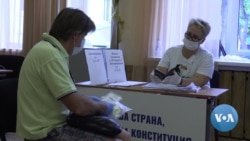Russians are voting in a national plebiscite that is expected to endorse a raft of constitutional amendments that would enable President Vladimir Putin to seek two more terms and potentially remain in office until 2036.
July 1 is the final day of voting on the package, although polls have been open since June 25 -- an unprecedented weeklong vote authorities said was intended to reduce crowds amid the coronavirus pandemic.
The Kremlin has said the amendments are necessary for the country's stability and security, while Putin's critics charge they are a bid for the 67-year-old to secure power for life.
"We are not just voting for amendments," Putin said in a televised address on June 30 in which he urged Russians to approve the changes. "We are voting for the country in which we want to live...for the country...we want to pass on to our children and grandchildren."
Voters have only been given the option of accepting or rejecting the entire package of amendments. The government has pushed hard for a strong public endorsement of the changes.
WATCH: Video report from Moscow
Putin first proposed the sweeping amendments during a national address in January. The document was presented to the legislature just five days later after cursory discussion by a hastily formed "working group."
On March 10, the wording that would allow Putin to seek reelection in 2024 and 2030 was abruptly added.
The package of more than 200 amendments was adopted the next day by both the lower house of parliament, the State Duma, and the upper chamber, the Federation Council.
Putin initially scheduled the vote for April 22, but it was postponed because of the coronavirus pandemic.
In addition to enabling Putin to seek additional terms, the amendments would broaden the powers of the parliament in the formation of the government and redistribute some authority among various government structures.
They also explicitly state the priority of Russian law over international law, ban same-sex marriages, describe a "belief in God" as a core national value, define the Russian language as "the language of the state-forming ethnicity," and make it "impossible to alienate parts of the Russian Federation."
The vote comes amid growing discontent in Russia over the economic consequences of the coronavirus pandemic, and as polls have shown a decline in Putin's popularity in recent years. His approval rating sank to a low of 59 percent during the spring, according to the independent Levada Center polling agency.
Putin, a longtime KGB officer during the Soviet era, has been president or prime minister since 1999.
His supporters credit him with strengthening the country and its economy after the collapse of the Soviet Union and the crises of the 1990s.
Critics say he has weakened democratic institutions, marginalized political opponents, stifled criticism, and allowed corruption to flourish.







